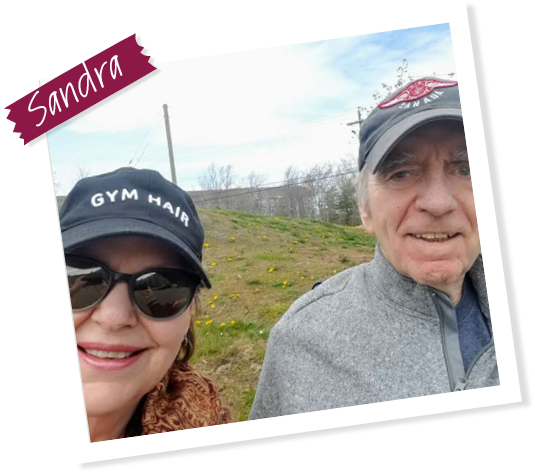Sandra D, caring for her husband
 I was a caregiver to my husband, Alan, who was diagnosed with Parkinson’s disease 8 years prior to his passing. We spent 29 wonderful years together. I am a mother of 2, a proud grandmother of 3 and an ESL teacher for adults. Alan was the best person I had ever met. His disease became debilitating during the last 2 and a half years of his life, following heart surgery that did not go well. I was told at the hospital, prior to his release six months after his surgery, that I would be provided the support I needed to remain his wife and not have to become his caregiver. This was far from the reality that followed.
I was a caregiver to my husband, Alan, who was diagnosed with Parkinson’s disease 8 years prior to his passing. We spent 29 wonderful years together. I am a mother of 2, a proud grandmother of 3 and an ESL teacher for adults. Alan was the best person I had ever met. His disease became debilitating during the last 2 and a half years of his life, following heart surgery that did not go well. I was told at the hospital, prior to his release six months after his surgery, that I would be provided the support I needed to remain his wife and not have to become his caregiver. This was far from the reality that followed.
Personal Support Workers came to the house when Alan came home; however, I was quickly informed by the agency that unless I cut down their hours to the maximum 100 a month, they would have to move Alan to a nursing home somewhere in the province. I wanted nothing more than to keep Alan comfortable and cared for in our home, so we cut down the hours and I took on more roles in his care. Looking back at my caregiving journey, it was plagued with a lack of enough support – from the lack of adequate hours of agency support to struggling with accepting help from family and acquaintances, for fear of being a burden.
I was doing the cooking, cleaning, groceries, scheduling appointments, and lifting and toileting Alan when he needed. During all of this, I was watching the love of my life deteriorate, day by day. I was tremendously burnt-out, frustrated, and heartbroken during my caregiving journey. Burnt-out because I was struggling to keep up physically and emotionally; frustrated because I felt misled at the hospital when I was told that I would remain his wife and not become his caregiver; and heartbroken because I was losing Alan day by day. I would mourn every small deterioration in his ability.
What broke my heart was that he was watching me lose myself. I would always tell him “It’s not you babe; I’m just burnt”, but I could see how guilty he felt that he needed my care so much. I couldn’t reassure him that I was ok because I wasn’t. I loved that man deeply. The memories I hold dear from his final two years at home were the moments when I felt like his wife again.
This was when we were on walks or had moments outside to get a breath of fresh air. We would chat, enjoy the weather and share a moment of normalcy. My biggest regret and heartache came from not having more of those moments with him in his final years. I was watching Alan die while constantly thinking of the next task that needed to be done. Without the proper support, I wasn’t able to be as compassionate as he deserved.
Taking care of oneself, ensuring that outside care is going to be adequate, and asking for help when needed, are the most important pieces of advice I could give anyone in my shoes. This can’t be done alone. It is paramount that the outside care is adequate for the caregiver to be able to do this. A caregiver cannot support anyone else properly if they don’t have the support they need.
